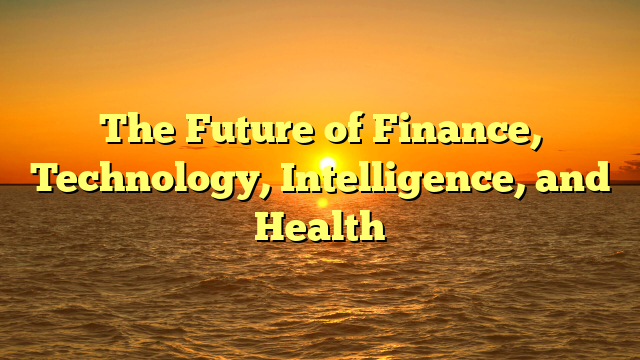—
In today’s rapidly evolving world, the interconnectedness of finance, technology, intelligence, and well-being has become more apparent than ever. These fields are not only reshaping how we live and work but also paving the way for innovative solutions to some of society’s most pressing challenges. This article explores how each of these areas is evolving and the impact they are having on individuals, businesses, and the global economy.
—
Finance: Navigating the Changing Landscape
In the world of finance, traditional systems are undergoing significant changes due to the rise of digital platforms, blockchain adoption, and cryptocurrencies. These developments are challenging the old paradigms of banking and investment management. As more people adopt digital payment methods, the demand for secure, decentralized financial solutions is growing. Blockchain technology, for instance, is enabling transparent, efficient, and secure transactions, eliminating the need for intermediaries.
Artificial intelligence is transforming finance by enhancing the decision-making process, improving fraud detection, and optimizing asset management. Machine learning algorithms help investors predict market fluctuations, and AI-driven platforms are increasingly being used for personal financial advice and portfolio management. The future promises a more efficient, data-driven, and accessible financial ecosystem.
—
The Role of Technology in Driving Future Innovation
Technological innovation is the primary driver of progress in fields such as finance, healthcare, and manufacturing. The integration of AI, machine learning, and data analytics is transforming how businesses operate and how people interact with technology. From smart devices to cloud solutions, these advancements are enabling industries to be more efficient, responsive, and data-driven.
The rise of AI and automation is enhancing the way businesses handle tasks that were previously time-consuming or labor-intensive. With AI-driven analytics, companies can process vast amounts of data to improve decision-making, forecast trends, and identify opportunities for growth. This has led to a shift toward more intelligent systems in areas like customer service, product development, and market research.
—
The Evolution of Intelligence: From AI to Human-like Cognition
AI and cognitive computing are becoming integral to industries looking to solve intricate challenges more effectively. Through machine learning algorithms, AI can simulate human cognitive processes, enabling computers to solve problems and learn from data more autonomously. This leap in computational power is transforming how industries approach problem-solving and innovation.
Cognitive computing, a branch of AI, is specifically designed to simulate the human thought process. With applications in healthcare, education, and enterprise management, cognitive computing is helping organizations make smarter decisions. For example, in healthcare, AI is enabling faster diagnoses, personalized treatments, and better patient care by analyzing medical data and predicting outcomes.
—
Advancements in Health and Wellness
Technology is revolutionizing healthcare, enabling faster diagnoses, more personalized treatments, and improved patient outcomes. Wearable devices, telemedicine, and AI-powered diagnostics are transforming the way doctors and patients approach health management. AI’s ability to predict diseases, analyze treatment efficacy, and personalize care is accelerating the shift towards more proactive and individualized healthcare systems.
DEWAKOIN is also transforming the field of personalized medicine by analyzing large datasets to identify patterns and correlations. These insights are helping doctors tailor treatments to individual patients, improving effectiveness and reducing side effects. As AI evolves, it will play an even greater role in the development of new therapies and vaccines, improving public health globally.
—
Ultimately, the integration of finance, technology, intelligence, and health is driving monumental shifts in how we live and work. These fields are complementing each other, creating a more interconnected and innovative world. The ongoing developments in AI, automation, and digital technologies will continue to shape the future, offering vast potential for improving financial systems, technological infrastructure, intelligence capabilities, and healthcare delivery.
